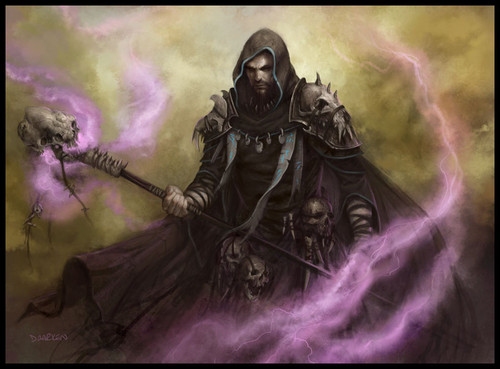Grimoire Necromancer (3.5e Class)
| |||||||||
| |||||||||
| |||||||||
|
Rate this article Discuss this article | |||||||||
Contents
[hide]Grimoire Necromancer[edit]
This class was designed with two goals in mind. The first was to simulate a Diablo II necromancer in D&D game terms. The second was to create a usable minion-based character for Grimoire games that puts a new spin on the defender role. I would like to think that this class succeeds at both goals (feel free to leave a message on the talk page if you have concerns about it falling short with either).
See http://classic.battle.net/diablo2exp/classes/necromancer.shtml for lots of information on the flavor of Diablo II necromancers.
Making a Necromancer[edit]
Necromancers are excellent defenders. Although the actual necromancers are just as squishy as any other spellcaster, they have minions to absorb damage and powerful curses to encourage their enemies to direct attacks at their minions. And that is really the way combat goes for them. They curse an enemy and arrange their minions to best defend them and/or their allies.
Necromancers understand the delicate balance between life and death. They are able to manipulate negative energies and use them for the purposes of justice and good if that is their way.
Abilities: Intelligence determines your DCs and your minions' AC. Charisma determines your skill with the teeth ability, boosts several of your curses, and determines your minions' bonus to attack rolls.
Races: Necromancy is an art practiced in even the most primitive of societies. No one race is more or less likely to be a necromancer.
Alignment: Any. Feel free to figure out flavor for a lawful good necromancer. The necromancer in Diablo II is probably somewhere close to that, after all.
Starting Gold: 3d4×10 gp (75 gp).
Starting Age: Complex
| Level | Base Attack Bonus |
Saving Throws | Special | ||||||||||||||||||||||||||||||||||||||
|---|---|---|---|---|---|---|---|---|---|---|---|---|---|---|---|---|---|---|---|---|---|---|---|---|---|---|---|---|---|---|---|---|---|---|---|---|---|---|---|---|---|
| Fort | Ref | Will | |||||||||||||||||||||||||||||||||||||||
| 1st | +0 | +0 | +0 | +2 | Animate Dead, Curse, Teeth 1d4 | ||||||||||||||||||||||||||||||||||||
| 2nd | +1 | +0 | +0 | +3 | Curse, Poison Use | ||||||||||||||||||||||||||||||||||||
| 3rd | +1 | +1 | +1 | +3 | Animate Dead (Skeletal Mage), Teeth 2d4 | ||||||||||||||||||||||||||||||||||||
| 4th | +2 | +1 | +1 | +4 | Curse, Disguise Minions | ||||||||||||||||||||||||||||||||||||
| 5th | +2 | +1 | +1 | +4 | Animate Dead (Ghoul), Teeth 3d4 | ||||||||||||||||||||||||||||||||||||
| 6th | +3 | +2 | +2 | +5 | Curse, Speak with Dead | ||||||||||||||||||||||||||||||||||||
| 7th | +3 | +2 | +2 | +5 | Bone Wall, Animate Dead (Blood Golem), Teeth 4d4 | ||||||||||||||||||||||||||||||||||||
| 8th | +4 | +2 | +2 | +6 | Curse, Inhabit Minion | ||||||||||||||||||||||||||||||||||||
| 9th | +4 | +3 | +3 | +6 | Animate Dead (Shadow), Teeth 5d4 | ||||||||||||||||||||||||||||||||||||
| 10th | +5 | +3 | +3 | +7 | Curse, Inhabit Minion (speaking) | ||||||||||||||||||||||||||||||||||||
| 11th | +5 | +3 | +3 | +7 | Corpse Explosion, Teeth 6d4 | ||||||||||||||||||||||||||||||||||||
| 12th | +6/+1 | +4 | +4 | +8 | Bone Armor, Curse | ||||||||||||||||||||||||||||||||||||
| 13th | +6/+1 | +4 | +4 | +8 | Animate Dead (Corpse Fly), Teeth 7d4 | ||||||||||||||||||||||||||||||||||||
| 14th | +7/+2 | +4 | +4 | +9 | Curse, Witness Death | ||||||||||||||||||||||||||||||||||||
| 15th | +7/+2 | +5 | +5 | +9 | Bone Prison, Teeth 8d4 | ||||||||||||||||||||||||||||||||||||
| 16th | +8/+3 | +5 | +5 | +10 | Curse, Necromantic Path | ||||||||||||||||||||||||||||||||||||
| 17th | +8/+3 | +5 | +5 | +10 | Greater Corpse Explosion, Teeth 9d4 | ||||||||||||||||||||||||||||||||||||
| 18th | +9/+4 | +6 | +6 | +11 | Curse, Poison Nova | ||||||||||||||||||||||||||||||||||||
| 19th | +9/+4 | +6 | +6 | +11 | Revive, Teeth 10d4 | ||||||||||||||||||||||||||||||||||||
| 20th | +10/+5 | +6 | +6 | +12 | Curse, Necromantic Master | ||||||||||||||||||||||||||||||||||||
|
Class Skills (2 + Int modifier per level, ×4 at 1st level) | |||||||||||||||||||||||||||||||||||||||||
Class Features[edit]
All of the following are class features of the necromancer.
Weapon and Armor Proficiency: Necromancers are proficient with light armor, shields, simple weapons, and scythes.
Animate Dead (Su): Necromancers can animate the dead. Go figure! You should begin play with a full set of minions, but otherwise, you can have 4 of any combination minions that you qualify for at any given time.
To create a new minion, you can spend a standard action to form the materials of a corpse within close range (possibly one you have just slain) into an undead minion of your choice. You cannot use a minion's body that has already been destroyed. Minions can be created from any corpse that at least has the basic logical components for the minion type (a skeletal system for a skeleton, flesh for a zombie or corpse fly, or both for a ghoul). Shadows only require a mortal creature to have died.
When a minion is formed, it may need to reform its shape. If the minion's size or shape doesn't match the corpse, then components of the corpse will magically stretch or compress to fit the proper size and shape. If the size and general shape fit, such as a 4-armed humanoid corpse being turned to a skeleton, the minion won't be reformed (but doesn't get any special bonuses besides looking a bit more awesome).
Minions only have combat statistics, however they can assist in simple tasks such as carrying, pushing, or dragging. For any such task, they use your Intelligence score as their Strength score and your Charisma score in place of their Dexterity score. Minions cannot take any type of special action (such as tripping) unless otherwise noted. They generally just attack or move, which is why a full statistic set is not necessary for them.
You can command your minions as a free action on your initiative as long as you are mentally capable (you can control them when paralyzed, but not confused for example).
Minions do not threaten any area, but they can still attack enemies within their reach on your turn and may still benefit from flanking as if they threatened an area (they do not provide flanking, however). Furthermore, because they do not threaten any area, it is possible for enemies to freely move into and through their space without provoking attacks of opportunity; enemies instead treat a space they occupy as difficult terrain. Creatures can even end their movement in the same space as a minion.
- Replace any HD entry in a minion's combat statistics block with your HD.
- Replace any Int entry in a minion's combat statistics block with your Int modifier.
- Replace any Cha entry in a minion's combat statistics block with your Cha modifier.
For every 4 necromancer class levels you have, your minions also gain a +1 bonus to any statistic with an Int or Cha entry. If for any reason a minion needs to make a die roll that is not provided in their statistics block, use your modifier. For example, you would use your modifier to oppose a trip check when one of your minions is the subject of a trip attempt.
Whenever one of your minions is destroyed, you take damage equal to 1/8th of your max hp (round up).
Minions
The following is a list of the minions you can use (with their required class levels and statistic adjustments, if applicable).
1st level necromancer
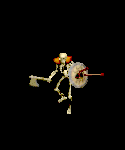 |
|
|||||||||||||||||||||||
 |
|
|||||||||||||||||||||||
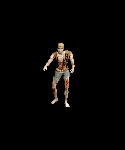 |
|
|||||||||||||||||||||||||||
3rd level necromancer
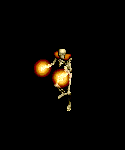 |
|
|||||||||||||||||||||||
5th level necromancer
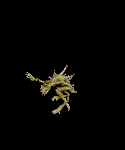 |
|
|||||||||||||||||||||||||||
7th level necromancer
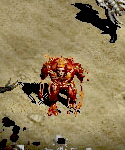 |
|
|||||||||||||||||||||||||||
9th level necromancer
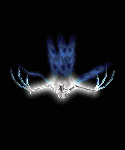 |
|
||||||||||||||||||||||||||||
13th level necromancer
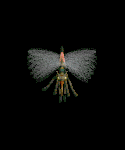 |
|
|||||||||||||||||||||||||||
Curse (Su): At 1st level and every even level, you gain access to one of the following curses. The DC for a curse is equal to 10 + 1/2 your HD + 1/2 your Intelligence modifier.
To curse a creature, a necromancer must hit it with a ranged touch attack. The creature must be within close range (25 ft. + 5 ft./2 levels).
A target of a curse makes a saving throw immediately when they are cursed as well as when you maintain the curse on your subsequent turns. A pass means that they are unaffected by the curse for 1 round, a failure means that they are affected by the curse for 1 round. Curses must be maintained (and require additional saving throws each turn) by spending a swift action each round, unless otherwise noted.
An individual curse can only have one instance in effect at a time and it cannot be used again until 3 rounds have passed since it was last in effect. Curses require a standard action to activate.
Curses come in 3 ranks: least, lesser, and greater. Each time you select a curse, you improve its rank by one step (you must meet any prerequisites listed in the curse description).
Alacrity (Su): You create a dizzy haze around your enemies, causing them to react more slowly to your minions.
- Least: A single target creature within close range becomes threatened by your minions (your minions normally don't threaten squares). This effect does not allow a saving throw. Ranged minions still do not threaten an area.
- Lesser, required class level 4: If a minion hits with an attack of opportunity against a creature that is taking a move action, the creature must make a Reflex save or else the remainder of its move action is halted. This effect can only be used once per round.
- Greater, required class level 10: Your minions' reach is extended by 5ft. You may also target a number of creatures equal to 1/2 your Charisma bonus.
Amplify Damage (Su): You say a particularly vulgar curse, wishing your enemies terrible harm.
- Least: A single target creature within close range must make a Will save each round or take extra damage from your minions equal to your Charisma bonus. They also take extra damage from any other single source of damage equal to 1/2 your Charisma bonus. The maximum extra damage the creature can take each round from this curse is 2x your Charisma bonus.
- Lesser, required class level 4: The maximum extra damage the creature can take each round from this curse is 3x your Charisma bonus. Your minions deal extra damage equal to 1.5x your Charisma bonus.
- Greater, required class level 10: The maximum extra damage the creature can take each round from this curse is 4x your Charisma bonus. Your minions deal extra damage equal to 2x your Charisma bonus. Other sources of damage deal extra damage equal to your Charisma bonus.
Attract (Su): A red glow lines the edges of your enemy's vision and their sight becomes focused on killing one target at all costs.
- Least: When you use this ability, choose a single ally (or minion) and a single creature in close range. The creature must make a Will save each round or take a -2 penalty to attack rolls and a -2 penalty to DCs for abilities that do not include the ally as part of the effect.
- Lesser, required class level 4: The penalty increases to -3 and the creature takes 1 damage per HD if it does not use an ability that includes the ally as part of the effect.
- Greater, required class level 10: The penalty increases to -4 and the creature still takes a -2 penalty on a successful save.
Confuse (Su): You laugh maniacally and draw a 6 pointed star in the air; your enemy loses grip of reality and acts without reason.
- Least, required class level 6: A single target creature within close range must make a Will save each round or act as though confused until its next turn. A single successful save against this effect renders a creature immune to it for the remainder of the encounter. This curse takes a standard action to maintain instead of a swift action.
- Lesser, required class level 12: You can choose an ally within close range to be considered the caster for this ability (so a result of "attack the caster" will cause the creature to attack your ally instead of you).
- Greater, required class level 18: You may target 2 creatures instead.
Decrepify (Su): You shake a twisted rattle and your enemy's muscles begin to fail them.
- Least: A single target creature within close range must make a Fortitude save each round or else its speed is reduced by 50% (round down to the nearest 5ft. increment) for all of its movement modes.
- Lesser, required class level 8: It is slowed instead. You must use a standard action to maintain Decrepify at this rank or the greater rank (you may still use the least rank to maintain it as a swift action).
- Greater, required class level 16: The creature is slowed, but it also cannot move more than 5ft. on its turn.
Dim Vision (Su): You create a blurry cloud around your enemies, causing them to miss their attacks.
- Least: A single target creature within close range must make a Will save each round or receive a 20% miss chance due to concealment (this has no effect on creatures that ignore concealment).
- Lesser, required class level 8: This ability affects a creature even if it normally ignores concealment. The miss chance improves to 40%.
- Greater, required class level 16: The creature is blinded with all of its basic senses instead (this will not affect telepathy, but will affect blindsight). You must use a standard action to maintain Dim Vision at this rank (you may still use the lesser rank to maintain it as a swift action).
Iron Maiden (Su): You cackle and chant "an eye for an eye!"
- Least, required class level 6: A single target creature within close range must make a Fortitude save each round or take damage equal to your Charisma bonus when it attacks a creature other than one of your minions.
- Lesser, required class level 12: The creature takes damage equal to 1.5x your Charisma bonus when it attacks a creature other than one of your minions and damage equal to 1/2 your Charisma bonus when it attacks minions.
- Greater, required class level 18: The creature takes damage equal to 2x your Charisma bonus when it attacks a creature other than one of your minions and damage equal to your Charisma bonus when it attacks minions.
Life Tap (Su): You slice your palms and fan them in the direction of your enemy; his vitality flows away from him and towards your allies.
- Least, required class level 6: A single target creature within close range must make a Fortitude save each round or else each attack that deals damage to the creature heals the attacker by 1 hp per 2 HD of the creature. An individual attacker can only heal hp once per round from this ability and cannot heal more than 50% of its maximum hitpoints. Healing from life tap does not trigger Healing Surges.
- Lesser, required class level 12: Whenever one of your minions hits the creature, you heal 1 hp per 3 HD of the creature. You cannot heal more than 50% of your maximum hitpoints from this curse.
- Greater, required class level 18: Whenever one of your minions hits the creature, you heal 1 hp per HD of the creature instead.
Lower Resist (Su): You draw a small amount of blood from yourself and make a crescent shape in the air; your enemy becomes more vulnerable to attacks.
- Least: A single target creature within close range must make a Fortitude save each round or have all forms of its damage reduction reduced to 0 against your minions and reduced by your 1/2 your Charisma bonus against other creatures.
- Lesser, required class level 6: It reduces the damage reduction by your full Charisma bonus instead.
- Greater, required class level 12: This curse requires no action to maintain.
Terror (Su): You conjure images of the most nightmarish things into your enemy's mind.
- Least, required class level 6: A single target creature within close range must make a Will save each round or have their fear level raised one step, to a maximum of frightened (from no fear level to shaken or shaken to frightened). If they pass a Will save from this ability, all of their fear levels caused by this ability are removed (they are still affected by other fear effects). Subsequent failed Will saves from this ability can continue to raise their fear level. This curse takes a standard action to maintain instead of a swift action.
- Lesser, required class level 12: The maximum fear level becomes panicked. You can also affect creatures that are normally immune to fear, but they get a +4 bonus on their saving throw.
- Greater, required class level 18: You may target 2 creatures instead.
Weaken (Su): You laugh at your enemy and watch as their blows become ineffective.
- Least, required class level 6: A single target creature within close range must make a Fortitude save each round or have its damage be reduced by 1 per 2 class levels on the first attack it makes each round.
- Lesser, required class level 12: The damage is reduced by 1 per class level on the first attack it makes each round instead.
- Greater, required class level 18: The damage is reduced by 2 per class level on the first attack it makes each round instead.
Teeth (Su): As a standard action that does not provoke attacks of opportunity, you can fire several sharp teeth at any number of targets within close range. You may distribute your 1d4s of damage any way you like among the targets and you make a single ranged touch attack roll using your Charisma bonus in place of your Dexterity modifier if it is beneficial, comparing the result to each target's AC. The damage is magical piercing damage.
Poison Use (Ex): Necromancers are trained in the use of poison and never risk accidentally poisoning themselves when applying poison to a blade.
Disguise Minions (Su): Necromancers are often shunned in populated areas because of their undead minions. For this reason, most necromancers learn how to use both magic and their own natural talents to disguise their minions. You gain a +10 bonus when disguising your minions, as if the minion were under the effect of a Disguise Self spell. If the minion you disguise was not a reformed minion (eg. a skeleton or zombie created from a humanoid or monstrous humanoid), then the disguise will resemble the minion's form in life and viewers will not get a spot check bonus to notice the disguise being the specific person.
Speak with Dead (Sp): Necromancers are able to speak with the dead with a skill better than any other. Once per day per 3 class levels, you can cast Speak with Dead as a spell-like ability with a caster level equal to your class level.
Inhabit Minion (Su): As their mastery of the spiritual realm grows, a necromancer learns to put their life into unlife. For many necromancers this experience may lead them to pursue Lichdom in the future. By performing a 1 minute ritual at any range, you can inhabit the body of one of your minions, controlling it directly and perceiving through its supernatural senses. You have perfect control over the minion's body and can use its abilities or any of your own skills or abilities.
While inhabiting a minion, the minion does not count as a minion for the purposes of your class features. It also threatens an area appropriate to its size and doesn't have the minion rules apply to it other than having 1 HP.
Initially you cannot speak while inhabiting a minion. This restricts your access to curses since they require a verbal component. When you reach 10th level, this restriction is lifted.
Bone Wall (Su): As a full-round action that provokes attacks of opportunity, usable once per minute, you can conjure a wall of bone that is 5ft. wide and in a line with a maximum length of 5ft. per class level. The wall is 10ft. tall and each 5ft. square section of the wall has 15 hp + 1 hp per class level. After an hour, the bone shatters into a fine dust.
Witness Death (Su): Necromancers can sense the spiritual chains to life that were broken by death for creatures. The remnants of these chains are tangible energies to a necromancer that can give insight into how a creature died. By touching a corpse, you can enter a trance-like state to watch the last five minutes of a creature's life from its senses. This information is perfectly detailed if the creature died within one hour. For each hour afterwards, one detail about the killers (if any) will be obscured: face, voice, murder weapon, full form. These become shadowy blurs if visual or static sounds if auditory.
After the corpse is at least one day old, the last minute before death will be blurred and undecipherable. After one week, the last two minutes will be undecipherable. After 1 month, the last 3 minutes will be undecipherable. After 6 months, the last 4 minutes will be undecipherable. And if the corpse is over a year old, the entire 5 minutes will be undecipherable.
Corpse Explosion (Su): As a full-round action that provokes attacks of opportunity, a necromancer can cause the corpse of one of his destroyed minions that is within medium range to explode. Each creature within a 5ft. radius of the remains of the minion's corpse must make a Reflex save DC 10 + 1/2 character level + Intelligence modifier or take 1d6 fire damage per 2 class levels. A successful save halves the damage.
At 17th level, the explosion radius increases to 10ft and, as a free action when one of your minions is destroyed, you can cause its corpse to explode.
Bone Armor (Su): At 12th level, a necromancer can create a charm from the spine of a monster he has slain with a CR of at least 12. This charm, when activated as a swift action, creates a set of bone armor for the necromancer. This armor counts as light armor, but is otherwise identical to a masterwork breastplate. The charm can be enchanted as if it were armor, and bestows the bonus to the bone armor. The charm can only be activated by the necromancer and the bone armor crumbles to dust if he removes it (he can also will it to crumble to dust as a swift action).
Bone Prison (Su): As a full-round action that provokes attacks of opportunity, usable once per encounter, you can conjure a cage made of massive bones, that surround a creature on the ground. The cage has 5 hp per class level (75 to start) and is a complete sphere (the lower half being underground). After an hour the bone prison shatters into a fine dust.
Necromantic Path (Ex): You have mastered the art of necromancy and are able to pursue something much more grand than what a mortal life brings. At level 16 you can choose one of the following paths, gaining an ability at this level and another at 20th level.
Path of the Lich: You thirst for immortality and your mastery over unlife has provided you the perfect means to that end. You create a phylactery to store your soul. If you are killed, you can choose to come back to life 1 day later per character level you have as if a Resurrection spell was cast on you (including the level loss penalty). You reappear at the location of your phylactery.
Path of the Spirit: You vow to finish your life as it was naturally intended, dying as all mortals do. You know your gift with necromancy will mean more to the future and your place in the great cycle is to guide others. You can make Bardic Knowledge checks as if you were a bard of your class level + 5, but only for topics related to life, death, and/or necromancy.
Poison Nova (Su): As a full-round action that provokes attacks of opportunity, usable once per day, you can emit a burst of poisonous energy that weakens your enemies. Each living creature within 30ft. must make a Fortitude save DC 10 + 1/2 your HD + 1/2 your Intelligence modifier or be afflicted by a poison that nauseates them for 1 round and sickens them for 4 rounds. Even on a successful save, they are sickened for 5 rounds.
Revive (Su): As a full-round action that provokes attacks of opportunity, usable once per day, you can bring a creature back from the dead, under your control. The creature has all of the same statistics as it did before it died and is at its maximum hitpoints, but its type is changed to Undead, giving it the immunities and qualities of an undead creature (its hitpoints are not adjusted by the loss of a Constitution score, however). You must spend a standard action each round to maintain control of the creature and you can control it for a maximum of 1 minute before the creature's body dissolves to dust.
Necromantic Master (Ex): You are a true master of necromancy and your path is complete.
Path of the Lich: You are treated as Undead for spells or abilities when it would be beneficial and you are immortal (you won't die of aging).
Path of the Spirit: When you die of old age, you choose a site for your spirit to inhabit. There you can take a spectral form and share wisdom to those who need it. You can also enter a willing vessel, controlling them similar to a Magic Jar spell. Unlike magic jar, their soul does not leave their body and instead is present for whatever journey you take the individual on (and can communicate with you). If the individual ever becomes unwilling to be controlled, you immediately are released from the body and return to your spiritual site.
Human Necromancer Starting Package[edit]
Weapons: Scythe, light crossbow (20 bolts).
Skill Selection: Pick a number of skills equal to 3 + Int modifier.
| Skill | Ranks | Ability | Armor Check Penalty |
|---|---|---|---|
| Concentration | 4 | Con | — |
| Disguise | 4 | Cha | — |
| Heal | 4 | Wis | — |
| Hide | 4 | Dex | — |
| Intimidate | 4 | Cha | — |
| Move Silently | 4 | Dex | — |
| Spellcraft | 4 | Int | — |
Feat: Point Blank Shot.
Bonus Feats: Precise Shot.
Gear: Leather armor, backpack, 3 days trail rations, bedroll, sunrod.
Gold: 2d4.
Curses: You have the least Attract curse.
Minions: You begin play with 2 skeletons and 2 skeletal archers.
Skeleton
- Undead Type
- Attack bonus: 1 + your Charisma modifier
- Damage: 1 bludgeoning, piercing, or slashing (choose on creation)
- Base Land Speed: 30 ft.
- 1 hp (1 HD)
- AC: 11 + your Intelligence modifier, touch: 10 + your Intelligence modifier, flat-footed: 10 + your Intelligence modifier
- Saving throws: Your saving throws - 1, Evasion and Mettle
Skeletal Archer
- Undead Type
- Attack bonus: 1 + your Charisma modifier, ranged with a 60ft. range increment (max 600 ft.)
- Damage: 1 piercing
- Base Land Speed: 30 ft.
- 1 hp (1 HD)
- AC: 10 + your Intelligence modifier, touch: 10 + your Intelligence modifier, flat-footed: 9 + your Intelligence modifier
- Fort: Your fort save - 3, Mettle
- Ref: Your will save - 1, Evasion
- Will: Your will save - 3, Mettle
Campaign Information[edit]
Playing a Necromancer[edit]
Religion: As you might expect, necromancers tend to worship deities that preside over death. Not all necromancers are concerned with religion, however. The ones that are concerned tend to worship out of respect for the dead that they use or to pay homage to a possible source for their dark powers.
Other Classes: A necromancer's affinity to the dead can often be unsettling to other adventurers and even outright offensive to others. One redeeming quality that even those that abhor undead can concede is that necromancers only use the dead for a short amount of time before returning the bodies back to the earth. And, many good necromancers will argue, that using the bodies of evil creatures against other evil creatures is really no different from mind controlling magic or even clever diplomacy.
Combat: Necromancers focus on diverting attacks in combat towards their minions. Many necromancers will have several curses that will entice their enemies to target their minions instead of themselves or an ally.
Advancement: Necromancers can make good use by multiclassing into classes that offer capabilities to draw attacks or protect allies. Extra HP can help offset the necromancer's rather poor d6 HD.
Necromancers in the World[edit]
| “ | Die. Die! Time to die. Die... | ” |
| —Arthorax, Human Necromancer | ||
Necromancers are loners in civilization, but blend in well with those that also stand apart from regular folk: adventurers. Pretty much any society, whether it is against the law or encouraged, has some members that practice necromancy. And with necromatic magic comes necromancers.
Organizations: Necromancers have exclusive guilds where they can freely operate and hidden societies where they cannot. Many necromancers consider themselves superior to others because they have gained mastery over the one weakness of (most) mortals: death.
NPC Reactions: I think we all know how people react to necromancers. Some people will be disturbed, others might consider getting torches and pitchforks. More than likely, however, they will be met with caution and suspicion (which is why many necromancers invest in disguise).
Necromancer Feats[edit]
Back to Main Page → 3.5e Homebrew → Classes → Base Classes
| Andrew Arnott's Grimoire Homebrewv | ||
|---|---|---|
| Base Classes | Grimoire Necromancer | |
| Prestige Classes | Barbarian, Sublime, Ninja of the Ebon Shadow | |
| Feats | Dodge, Aarnott, Get Over Here!, Ki Feint | |
| Talk | ||
| Allowed Alignments | Lawful Good +, Lawful Neutral +, Lawful Evil +, Neutral Good +, Neutral +, Neutral Evil +, Chaotic Good +, Chaotic Neutral + and Chaotic Evil + |
| Article Balance | High + |
| Author | Aarnott + |
| Base Attack Bonus Progression | Moderate + |
| Class Ability | Other + |
| Class Ability Progression | Other + |
| Fortitude Save Progression | Poor + |
| Identifier | 3.5e Class + |
| Length | 20 + |
| Minimum Level | 1 + |
| Rated By | Ghostwheel +, ThunderGod Cid +, Foxwarrior + and MisterSinister + |
| Rating | Rated 3 / 4 + |
| Reflex Save Progression | Poor + |
| Skill | Concentration +, Craft +, Decipher Script +, Disguise +, Heal +, Hide +, Intimidate +, Knowledge +, Move Silently +, Profession + and Spellcraft + |
| Skill Points | 2 + |
| Summary | A necromancer designed to have abilities similar to the Diablo II necromancer. + |
| Title | Grimoire Necromancer + |
| Will Save Progression | Good + |

